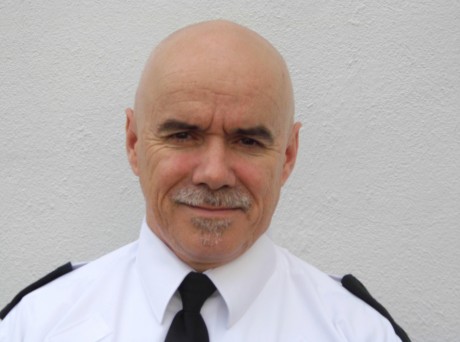
PSNI Area Commander, Chief Inspector Joe McMinn
COMMUNITY groups in Lisnaskea, including Lisnaskea Chamber of Commerce, have met with senior police officers to secure a return to neighbourhood policing.
Some ‘beat’ police have been absorbed into the PSNI’s Rapid Response Teams and one leading personality in the chamber has described the current policing structures as, ‘a shambles’.
This claim has been robustly denied by the PSNI’s Area Commander, Chief Inspector Joe McMinn.
He told the Herald this week that police officers working in the Lisnaskea area are committed to ensuring it is a safe place to live, work and socialise.
He commented: “I would like to reassure Lisnaskea residents that local resourcing levels are kept under constant review to ensure a professional service is provided.”
The fight to bring back ‘beat’ officers is being led by former Fermanagh councillor, Jean McVitty, the press officer of Lisnaskea Chamber.
She recently had a face-to-face meeting with senior PSNI officers where she was accompanied by the president of Lisnaskea chamber, Maisie McElwaine.
Mrs McElwaine instanced the contribution of Constable Derek Friel, a member of the Fermanagh South Neighbourhood Policing Team.
“He was well respected by every community. He was taken away without any consultation with the chamber, and not replaced. He had a great rapport with the young people, and organised workshops in Share (Centre) for the young.
“I also know, from speaking to some of them, they were very impressed and thought an awful lot of him.”
Mrs McVitty tabled a letter from the manager of the Oak Healthy Living Centre which is based in Lisnaskea.
In it, Micheal Mowen explained that, since 2003, the centre had been involved in promoting good mental health and a wide range of community initiatives, including drug abuse awareness and alcohol prevention for young people across south Fermanagh.
He said he feared that the change from a community policing role to a largely enforcement role will be detrimental to effective policing.
“There are considerable social problems in the area, with an unprecedented level of suicide, alcohol and drugs misuse, road traffic accidents and other community issues.
“The community policing approach has made a difference. The police constantly meet people who are vulnerable. A close working relationship with local services means that they can discreetly connect people to local initiatives.
“Without any fuss, they can then they can get the support they need to overcome whatever crisis situation we are experiencing.
“There is now a danger that the strong links that have been built in the local community will be damaged.”
Mrs McVitty described the new policing structures as, ‘a shambles’.
But, it was a claim flatly rejected by Chief Inspector McMinn.
He told the Herald that police officers are spending more time out of the stations than ever before.
“We have prioritised visibility by way of local beats and patrols, particularly in more rural areas. Policing is only part of the solution to many of the issues facing local communities.
“Technological advances within the PSNI have also meant we are better equipped to have the right officers in the right place at the right time. Indeed, patrolling patterns are based on thorough and detailed analysis of the nature, time and location of incidents and crimes reported to us and officer duties are detailed to reflect these.”








